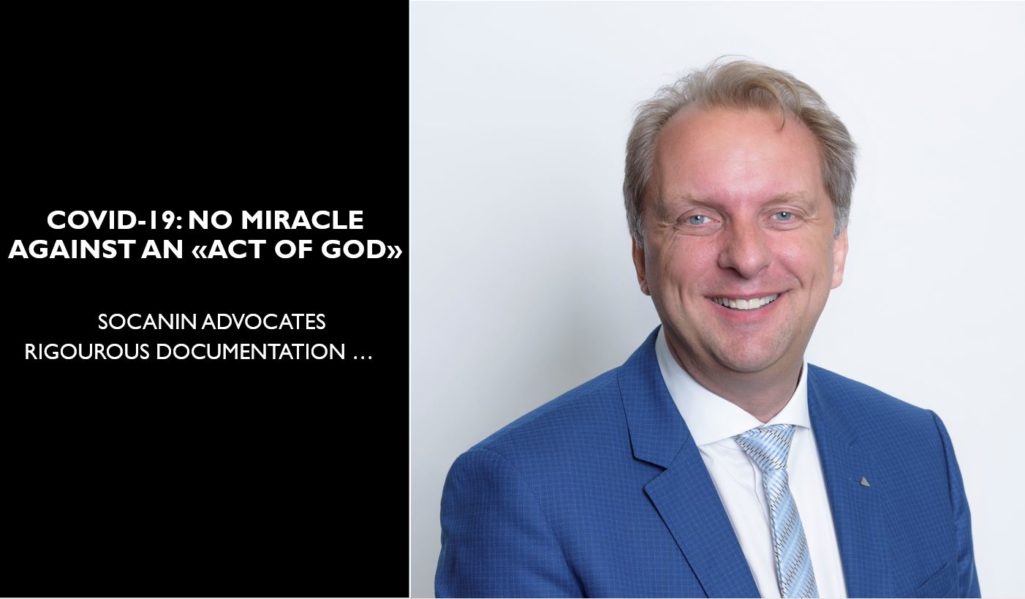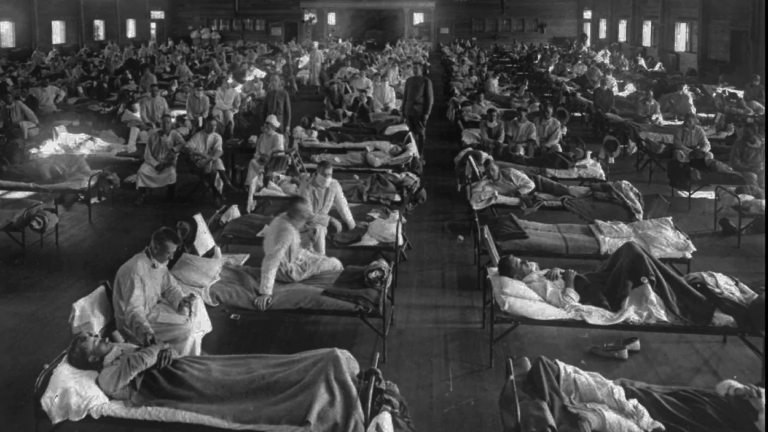
NO MIRACLE AGAINST AN ‘ACT OF GOD’
(SOCANIN ADVOCATES RIGOUROUS DOCUMENTATION)
A little over one century ago (late September, 1918), a pandemic that was dubbed as “The Spanish Flu” hit the Province of Québec, after taking millions of lives, in Europe. That virus ended up making some 15,000 victims in Québec…
The economic boom, that ensued the end of World War I (1914-1918), would then undergo a major and unexpected makeover, due to the impact of the pandemic on the job market.

That situation, just like the ‘Covid-19’ pandemic of 2020, was unprecedented and, as per many analysts and experts, fell into the ‘ACT OF GOD’ narrative.
PANDEMIC HALTS
As it was the case with that early-20th-century pandemic, this one, of 2020, has lead to a halt of commercial, industrial, and construction activities.
Before that stoppage of 1918, Québec had just endowed itself with new structures, namely the railway tunnel that passes under Mount-Royal, the Sun Life building, and the Quebec City Bridge.
Some 100 years later, the current mandatory halt comes only a few months following the inauguration of the new Samuel-de-Champlain Bridge.
Collaterally, large-scope projects that are underway will undoubtedly suffer the consequences of that temporary — but very costly — situation. Among those projects: REM, CHUM, and the Turcot-Exchange road complex.
During the hard pandemic times online world has reached its full potential. Among all the possible options online games were on top, one of the examples – online casino frei spiele. Try and enjoy your free time playing online with ease and comfort.
WHO SHALL PAY THE BILL?
The abrupt stoppage of those important projects, due to Coronavirus, will bring about chaos in the accounting, judicial and social fields.
The crux of the problem will be to determine to whom shall lie upon the responsibility of paying for the (projected) astronomical bill for each interrupted project: the promotor or the entrepreneur?
That question will be simpler to answer, if a clause to that effect is included in the contract linking the two parties.
It would however be surprising that such a clause had been thought of beforehand. It is then foreseeable that discussions will take place, so as to identifying which of the two parties will have to roll out its cheque book…
Because even though construction sites are closed, until further notice, there are costs inherent to such projects.
Workers of various walks of trades are now finding themselves jobless, but will receive financial aid/ compensation from their government.
But the managers of those projects on hiatus still must continue to work and keep a close eye on the situation, as well as preparing for the eventual resuming of activities.
In administrative lingo, one uses the term “overhead”, that is to say current expenditure for a business that are not linked to costs of manpower or material, or third-party costs directly billed to the promotor (such as rent, financing, IT, etc).
LADY JUSTICE TO THE RESCUE
Discussions between the promotor and the entrepreneur, over who is liable for those overhead costs, could very well wind up in a dead end (and ensuing confrontation), which would not bode well for the continuation of the project.
Private and public projects alike are faced with the same reality. Pandemics, as we all know, never discriminate…
Those negotiations will indeed likely lead to an impasse, simply because of the unprecedented nature of the situation. No past leg to stand on, in terms of previous, similar cases (documented references to such situations).
The economic consequences of the (so-called) “Spanish Flu” are beyond calculable, but no post-mortem, from back then, ever left tips or advice on how to go about determining the responsibility of costs incurred by a work stoppage at a construction site.
As a result, law suits are probably just around the corner…
WHAT SOCANIN RECOMMENDS…
One way to minimise future chaos and second-guessing would be to follow the footsteps of certain governments, and health and public-safety organizations, by making sure to have a crisis-management action plan in place. A plan that would clearly sum up several potential scenarios (top five, risk-wise) and define their respective organizational structures. That plan would then also serve as a future reference, adaptable to whatever nature of crisis. Both simpler and – moreover – faster!
Secondly, if those are not included already, making sure to have provisions or clauses to future project-contracts, between promotors and entrepreneurs, that clearly designate the responsibility of overhead costs.
Furthermore, it would be imperative that all parties involved now start documenting crises on a day-to-day basis, as well as the decisions that are made and the justification for the latter, so as to weave for oneself pertinent documents that shall come handy in future contract discussions and negotiations.
Lastly, as the situation evolves, that information should be shared with all other parties involved. For validation purposes, and in order to minimise the chances of future misunderstandings and out-of-control situations.
It is simply a question of avoiding perhaps years of legal battles between professionals and lawyers, over something that could have been prevented through a little proactivity.
As the old saying goes (so matter-of-factly, in these times of pandemic): Prevention is better than cure.
To learn more about our services or to discuss with Mr. Pieter ‘s Heeren about your project, contact us!
